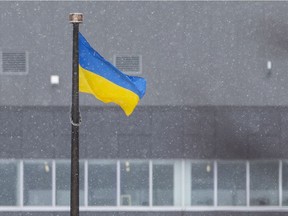[ad_1]

Article content
Local automotive firms are reacting with interest to an Automotive Parts Manufacturers’ Association proposal to recruit Ukrainian refugees and provide the newcomers with jobs in an industry in need of workers.
Advertisement 2
Article content
“We’re considering it,” said Larry Koscielski, vice-president of process and technology development for CenterLine (Windsor) Ltd.
“We’re educating ourselves. I think the manufacturing sector is as compassionate as any other sector in trying to help.”
For many in the local automotive sector, there is additional motivation to help as the tragic story playing out in Ukraine touches close to home. Many of the workers and owners of businesses in the vast collection of automotive plants in the Windsor area are either immigrants/refugees themselves or their parents were.
“I’m the son of two Polish immigrants who came here because they were displaced from their homes by World War II,” Koscielski said.
“When we look at helping the Ukrainian refugees, it’s more than just helping them start a new life for themselves. This generation is fleeing because they’re also thinking of the generation to follow.”
Advertisement 3
Article content
Koscielski said language barriers are one of the first hurdles that need dealing with on the plant floor. The company is now reaching out to its 800 Windsor employees to see who might be able to speak the language and serve as a translator.
“We definitely do see opportunities for them here,” Koscielski said.
“If they’re hard workers and have common sense, those are the essential ingredients of a good workforce.
“We can find them meaningful work here while they learn the language. We’ll train them for sure.”
The APMA estimates the automotive supply industry could absorb 500 people if government officials can connect the industry with the refugees. The program would also support refugees from any country.
Automate Canada/Canadian Association of Mold Makers president Jeanine Lassaline-Berglund said the organizations are working with federal immigration officials and the provincial Ministry of Labour, Training and Skill Development to expedite things while the Canadian Machining and Tooling Association is surveying companies open to quick employment.
Advertisement 4
Article content
“The challenge is connecting the dots,” said Laval International president Jonathon Azzopardi, who is also the chair of the Canadian Association of Mold Makers.
“Many of the refugees are in Poland. How do we get on their radar? How do we get them here?
“We’re definitely interested in helping.”
Azzopardi said the industry is short about 10 per cent of the workforce it needs.
He added many local firms have already started down the road of looking beyond the domestic labour market for employees. He has supervisory staff who speak Spanish and the company also issues communications in that language.
“All of my production staff (25 to 30 people) are from outside the country and half don’t speak English,” said Azzopardi, whose father Larry fled war-torn Italy as a 15-year-old and later founded Laval.
Advertisement 5
Article content
“Most are international students. It’s been an uphill battle, but we’ve learned and we’re starting to get good at it after 1 1/2 years.”
Cavalier Tool and Manufacturing sales manager Tim Galbraith said his company is also studying getting involved in the program.
“I’ve heard a lot of chatter around town and everyone is in favour of it,” Galbraith said. “It’s a great idea, but people want to know what’s involved.
“Traditionally it has been hard and it takes a long time to get workers into the country. I think if the government makes some changes to speed things up and make it less cumbersome, there’ll be more enthusiasm.”
twitter.com/winstarwaddell
[ad_2]
Source link






More Stories
Auto Repair: The Top Ten Mistakes Made by Your Mechanic
Swimming Pool Repair
NADA RV Values